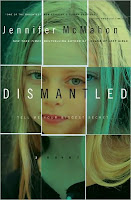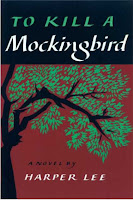I’m always disheartened when I look over my list of books I’ve read – or listened to – during the past year and realize I can’t recall a thing about many of them. No, this isn’t a consequence of advancing age. It’s always been the case: a lot of the books I read are instantly forgettable.
If I can remember the plot or style or – most important – the characters in a novel months after reading it, I know there’s something special about that book. It’s either very good or unforgettably bad. This year my list has an unusual number of terrific novels on it (some of them published in previous years).
 My favorite was The Help by Kathryn Stockett, not a mystery but a surprisingly suspenseful story about a young white woman in the 1960s south who secretly transcribes and publishes the tales told by black maids working in white households. This was a time and place when white people could kill blacks with impunity, so the risks taken by “the help” in the novel are enormous. The story is spellbinding and every character is unforgettable.
My favorite was The Help by Kathryn Stockett, not a mystery but a surprisingly suspenseful story about a young white woman in the 1960s south who secretly transcribes and publishes the tales told by black maids working in white households. This was a time and place when white people could kill blacks with impunity, so the risks taken by “the help” in the novel are enormous. The story is spellbinding and every character is unforgettable.I also loved The Last Child by John Hart, another intense, gripping novel set in the south. The child of the title is a boy who has watched his mother slowly destroy herself with drinking and an abusive relationship since her daughter disappeared. The young son is determined to find his sister, dead or alive, and give his mother some degree of peace. His probing sets off a string of terrifying consequences. I found The Last Child riveting, and I think it’s the best Hart has published so far.
 I read two Michael Robotham novels this year, Shatter and The Night Ferry, and this writer is now on my must-read list for his future work. Shatter is about a man whose past comes back to haunt him... only trouble is, he doesn’t believe it is his past. The Night Ferry is equally gripping but utterly different, except for the always superb writing. It introduces Alicia Barba, a British police detective who is the child of Indian immigrants, a character I would love to see in a series. When an old friend is murdered, a shocking revelation sends Alicia on a hunt for the truth about her friend’s life and the baby everyone thought she was about to have.
I read two Michael Robotham novels this year, Shatter and The Night Ferry, and this writer is now on my must-read list for his future work. Shatter is about a man whose past comes back to haunt him... only trouble is, he doesn’t believe it is his past. The Night Ferry is equally gripping but utterly different, except for the always superb writing. It introduces Alicia Barba, a British police detective who is the child of Indian immigrants, a character I would love to see in a series. When an old friend is murdered, a shocking revelation sends Alicia on a hunt for the truth about her friend’s life and the baby everyone thought she was about to have. Gillian Flynn’s Sharp Objects is a stunning debut. Her lead character is a young female newspaper reporter with a history of emotional problems that included a compulsion to cut herself. Now she’s out of treatment and must return home – the source of her troubles – to write about the murders of several children. Flynn’s insight into human behavior is keen and her prose is as sharp as the razors that tempt her heroine. The conclusion of the book is going to stay with me for a long time.
Gillian Flynn’s Sharp Objects is a stunning debut. Her lead character is a young female newspaper reporter with a history of emotional problems that included a compulsion to cut herself. Now she’s out of treatment and must return home – the source of her troubles – to write about the murders of several children. Flynn’s insight into human behavior is keen and her prose is as sharp as the razors that tempt her heroine. The conclusion of the book is going to stay with me for a long time.The Brutal Telling may win Louise Penny a third Agatha Award and a few other honors as well. She’s on a par with Julia Spencer-Fleming and Nancy Pickard, producing traditional mysteries with all the expected features – the familiar community, the beloved regular characters, respect for the gravity of murder without dwelling on the gore – plus the emotional depth and insight found in the best literature.

When Will There Be Good News? is, in my opinion, the best of Kate Atkinson’s Jackson Brody novels. Her books are considered more literary fiction than crime novels, but this one is as compelling as any mystery or thriller I’ve ever read. The opening sequence left me gasping in shock.
I loved Karin Slaughter’s Undone because it brought together Dr. Sara Linton from her Grant County series and Will Trent, the GBI agent from Fractured. This is a powerful story, perhaps the best Slaughter has ever written.
 Other novels I enjoyed this year are The Wrong Mother by Sophie Hannah, Dismantled by Jennifer McMahon, Death and the Lit Chick by G.M. Malliet, Exit Music by Ian Rankin (the last Rebus novel), The Blood Detective by Dan Waddell, The Private Patient by P.D. James (possibly the last Dalgliesh novel), The Keepsake by Tess Gerritsen, Careless in Red by Elizabeth George, Sand Sharks by Margaret Maron. I've just started Jeri Westerson's Serpent in the Thorns and I can tell already it's going to be one of my favorites. I have lots more 2009 releases that I haven't gotten to yet.
Other novels I enjoyed this year are The Wrong Mother by Sophie Hannah, Dismantled by Jennifer McMahon, Death and the Lit Chick by G.M. Malliet, Exit Music by Ian Rankin (the last Rebus novel), The Blood Detective by Dan Waddell, The Private Patient by P.D. James (possibly the last Dalgliesh novel), The Keepsake by Tess Gerritsen, Careless in Red by Elizabeth George, Sand Sharks by Margaret Maron. I've just started Jeri Westerson's Serpent in the Thorns and I can tell already it's going to be one of my favorites. I have lots more 2009 releases that I haven't gotten to yet.I feel as if I’ll never catch up with all the books I want to read, and now here comes 2010 with a whole new crop. Erin Hart’s False Mermaid in March, Julia Spencer-Fleming’s One Was a Soldier and Elizabeth George’s This Body of Death in April... Do you ever wish you could drop everything and just read for a few months?
What books did you love in 2009? What are you looking forward to in 2010?













